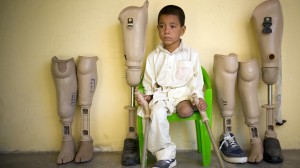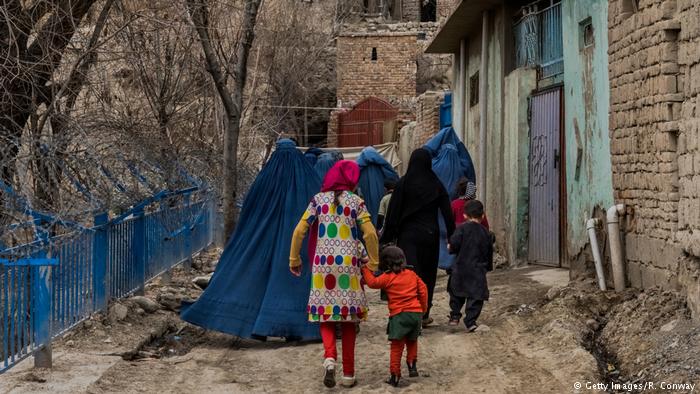Lives On The Edge: Clearing Landmine
Till a year ago, she could not have ever imagined that she would be working in a minefield every day, strapping on 25 kilograms of equipment to search for the very explosives that used to give her nightmares as a child. Today, though she can identify 10 different types of mines just by sight and, over time, the minefield has become familiar territory.
Nazokat Begmatova, a humanitarian deminer, didn’t have the opportunity to go to university, which reduced her chances of obtaining what would be widely considered ‘a good job’ in her country. However, rather than tying the knot right after school to ensure financial security, as is the common practice for girls in her country, Tajikistan, she wanted to get a job of her own.
As a humanitarian deminer with the Norwegian People’s Aid (NPA) she works with the national authorities to ensure the destruction of mines in heavily mined areas, a legacy of the Soviet-era conflict, which has claimed thousands of lives. In fact, Begmatova is part of the first all-female demining team for the NPA. Whereas it took more than three years for 24 women to be trained as deminers, in the end, only nine managed to make it through the challenging selection procedure to build the first female demining team, not only in Tajikistan and Central Asia, but in the whole post-Soviet area.
So far, Begmatova’s team has ‘released’ around 70,000 square meters of landmine contaminated area along the Tajikistan-Afghanistan border, having found and destroyed 777 antipersonnel mines. Now that she has had experience in the minefield, she plans to apply for a leadership position within a demining team as early as next year. Even leaving the community where she has spent all of her life is not a frightening step anymore, she says, because she knows she is on the right track. In this one-on-one, she talks about how she has grown up in a society where women are thought of primarily as homemakers, and how, through her current occupation, she has contributed towards changing perceptions.

An Afghan child with only one leg sits next to artificial legs at the International Red Cross Orthopedic (ICRC) rehabilitation center on December 10, 2009 in Herat, Afghanistan © picture-alliance/landov
Q: What do you think have been the most important factors that have helped in getting you where you are today?
A: The initial training by the NPA has been of crucial importance to me. Thankfully, being a woman was not a barrier in getting the best training to prepare for my job. On the contrary, the trainers and mentors were even more motivated to share their expertise in this area with me. It was all up to me and my desire to learn, to study more about mines. Having started, I just could not look back and could not accept any hurdles. I guess it was my inspiration to achieve something as a woman that brought me where I am now.
Q: Tell us a bit about your childhood, your ambitions and who inspired or influenced you?
A: My brother has always been very supportive of me. He has always told me to pursue my chosen path, even if it goes against the social norms and is not perceived as typical for women. I know that we [women] have to be better than men; we always have to win over men. If they achieve something, it means we, as women, too, can achieve it. We are equal.
Q: Has being a woman affected your path to realizing your ambitions?
A: I have heard rumors from some of my male colleagues claiming that women could not deal with a job that was this difficult. They were waiting to see us fail. But this didn’t happen, and they had no reason to be negative. Nowadays, women have to be and, in fact, are stronger than men. I have never thought that I could not be a deminer because I am a woman.
Q: What is it like to be one of the few women in demining work, which is predominantly male?
A: I am proud of myself. When people ask me what I do for a living, I am happy to explain to them. These days, when I come back from work, everyone looks at me with respect. This was not easy to get but, over time, I have managed to change their attitudes towards a woman who performs an atypical female job.
Q: What do you believe is your greatest contribution to society and to the community?
A: The idea that women belong at home, taking care of their children while men go to work and do big jobs has changed. A lot of young women, even married ones, with children and grandchildren, ask how they can follow in my footsteps. The good thing is that some people already look at my job as being something normal. Having their wives at work, some husbands have even started to take care of the household and of their wives at the end of the workday.
Apart from this fundamental social change, at a personal level, when I find a mine, I am happy. I am happy because I know that at this moment, I probably saved somebody’s life.
Q: What is your message for other women and girls who may be inspired by your journey and achievements?
A: They have to be active. They must not give up, but walk ahead. Work gives you the chance to become independent, feel your personal freedom.
(This article is part of U.N. Women’s Empowering Women — Empowering Humanity: Picture It! campaign in the lead-up to Beijing+20.) © Women’s Feature Service
Editor: Marjory Linardy
WTO RECOMMENDS
Making Rights Real For Women
When Maria Jose Pereira was growing up in the rural town of Escada, Brazil, her father’s tools were off limits. “Everyone in my house worked in construction. My father and brothers were all stonemasons,” Maria says. “I wanted to work with them, but they said I couldn’t because I was a woman.” (From June 6, 2015)
In The Midst Of War, A Women’s Rights Warrior
Born in the mid-50s in Mazar-i-Sharif, a cultural and religious site in Afghanistan with famous shrines that get thousands of visitors annually, Dr Habiba Sarabi’s childhood was similar to that of many girls in her country. She grew up in a lower middle class household where money was tight, and her father preferred her brothers. She had to work twice as hard to show that she was capable of doing as much as them, if not more. (From June 19, 2015)
Salma’s Story: Little Girls with Dreams Become Women with Vision
Salma is giving a silent message to all those people who keep on blaming society, culture, political unrest and financial troubles for their hopelessness and failures in life. She gives a message that we can be hopeful even when we are facing years and years of troubles and discomfort. (From May 22, 2015)







